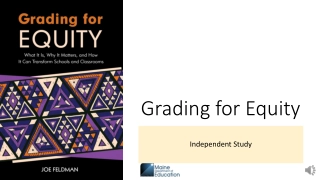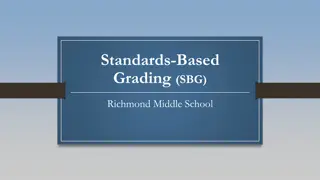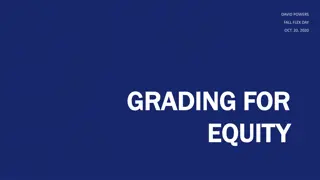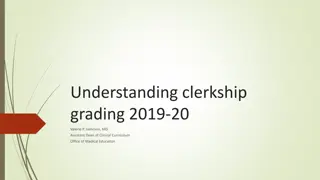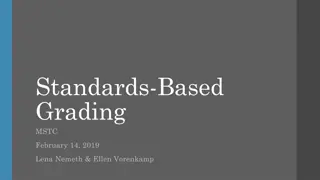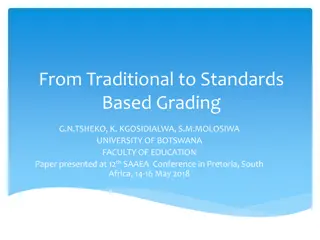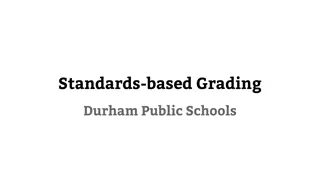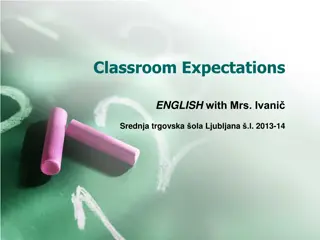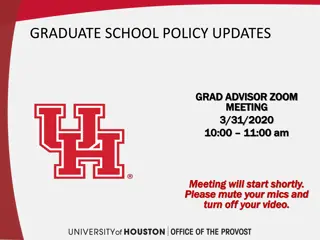Rethinking Grading Systems in Education
Research suggests that traditional grading systems may hinder student learning and motivation, leading to decreased interest, shallow thinking, and cheating. Ungrading, a more student-centered approach, promotes intrinsic motivation, allowing students to have a say in their assessment and emphasizing feedback over grades. Binary scoring and alternative incentives can also be effective in promoting learning without the negative impacts of traditional grading. It's crucial to reevaluate the role of grades in education to better support student growth and development.
Download Presentation

Please find below an Image/Link to download the presentation.
The content on the website is provided AS IS for your information and personal use only. It may not be sold, licensed, or shared on other websites without obtaining consent from the author.If you encounter any issues during the download, it is possible that the publisher has removed the file from their server.
You are allowed to download the files provided on this website for personal or commercial use, subject to the condition that they are used lawfully. All files are the property of their respective owners.
The content on the website is provided AS IS for your information and personal use only. It may not be sold, licensed, or shared on other websites without obtaining consent from the author.
E N D
Presentation Transcript
Emily Dosmar, Ph.D. Assistant Professor of Biology and Biomedical Engineering Rose-Hulman Institute of Technology Terre Haute, IN USA
Grades dont track student learning Grades alone Grades + Feedback Feedback alone Reference: Butler, Ruth, Enhancing and undermining intrinsic motivation: The effects of task involving and ego involving evaluation on interest and performance. British Journal of Educational Psychology58(1):1 14. May 2011.
Research shows that grades have three predictable effects Less interest in learning A preference in easier tasks Shallower thinking References: Alfie Kohn, Ungrading. 2021; Grolnick and Ryan, 1987.
Research also shows Do not track career success/achi evement In a study of English and history papers, there was a 39% disagreement between paper scores between graders Might seem objective, but are highly subjective Are This value increased significantly with geometry papers inconsistent Grades Encourage cheating Reduce creativity Don t measure growth
Ungrading Most pure Students help to decide their course grade Complete grade anarchy Decentralized authority Flexible timelines Emphasis on feedback
Binary scoring Assignment Score Feedback Homework assignment 1 Homework assignment 2 1 = complete 0 = revisit Lots of substantive feedback Appropriate for: Courses with terminal mastery Courses with right or wrong answers Freshman and Sophomore level courses
A different kind of incentive: My plan for my freshman binary ungraded MATLAB course Final project: build a game using at least two new functions and two custom functions in MATLAB Freshman level MATLAB n=~50 Appropriate for: all courses
Will how much effort are you putting into this class. Are you trying things on your own, following instructions, and being careful about your work? Do you look things up when you are unsure and try to figure them out before asking for help? Do you actively pursue knowledge, or do I have had to nudge you towards learning? Are you persistent? Skill how strong are your technical skills so far? Are you able to start the assignments on your own without help? How long do most assignments take you? Are you confident in your ability to make plots in Excel, write FOR loops, WHILE loops, IF statements, and SWITCH cases? If I asked you write some code during our meeting, could you do it? Were you confidence in your performance on Exam 1? Output-what is the quality of work that you have produced so far? Do you require a lot of revisions on your work? Has the feedback you ve received been positive? Are you proud of what you have submitted?
Learning reflections and mindfulness During our meeting, we will decide together what your midterm grade should be, so please be prepared for this conversation (being prepared means being able to justify, with evidence the grade you think you ve earned so far). Here is a reminder of our grading criteria:
Grade A (Excelling) Description Shows consistent and persistent effort in striving to meet all learning goals both in and outside of class. Consistently produces and submits exemplary work (seldom, if ever, missing any work) Meets expectations on all homework and classwork Values feedback, making adjustments to tasks and assignments, to the extent that the student seeks it out on his or her own instead of waiting for others to offer it. (Note: this does not mean feedback about directions that were clearly stated, but rather, feedback about content generated that could lead to increased learning). Shows the ability to help classmates who may need assistance Exhibits creativity and curiosity and goes above and beyond stated expectations Exhibits independence and self-reliance, does not require instructor input every step of the way Passes all exams at a B level Passes all quizzes Exceeds expectations on all projects Completes the final project including the demonstration at a conference level (more on this later) Complete self-assessment and attend midterm and final conferences Shows consistent effort in striving to meet all learning goals Produces and submits work regularly (seldom missing any work) Meets expectations on most homework and classwork Responsive to feedback, making adjustments to tasks and assignments, showing evidence of growth Passes all exams at a B level Passes all quizzes Meets expectations on all projects Completes the final project including the demonstration Complete self-assessment and attend midterm and final conferences Demonstrates effort in striving to meet most learning goals Meets expectations on enough homework and classwork to show some engagement with learning Somewhat responsive to feedback, beginning to show evidence of growth Passes all exams at a C level Completes all quizzes Completes all projects Completes the final project including the demonstration B (Applying) C (Developing)
Students do have the ability to accurately self assess 45 40 40 35 Number of Grades 30 25 20 15 10 9 10 3 5 1 0 0 -0.5 Instances of agreement between student and instructor estimated final grades (n=63) 0 0.5 1 1.5 2
50 46 45 40 35 In both courses, several grades were modified following the conferences, suggesting that the meetings resulted in meaningful conversations regarding course performance and gave the instructor additional insight into the student s performance and growth in the course beyond what the course assignments had provided. (Dosmar and Williams. 2022) Number of Grades 30 25 20 15 10 8 10 5 0 0 0.5 1 Final grade increase compared to instructor's initial estimate (n=63)
Course evaluations revealed three major themes Building a Foundation for Lifelong Learning Student Self- efficacy Learned HAD WANTED to learn Developing Student Agency Learn COULD
Some issues to anticipate Skewed distribution Do you care? Difficult conversations Push back from colleagues Slackers gonna slack
Follow me! @EmDosmar


